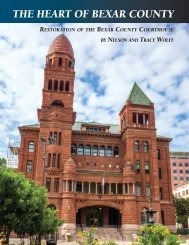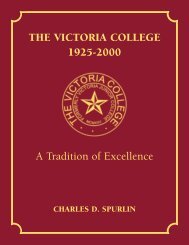Notable New Orleanians: A Tricentennial Tribute
An illustrated history of New Orleans paired with the histories of companies that have helped shape the city.
An illustrated history of New Orleans paired with the histories of companies that have helped shape the city.
Create successful ePaper yourself
Turn your PDF publications into a flip-book with our unique Google optimized e-Paper software.
INTRODUCTION<br />
On the occasion of the <strong>Tricentennial</strong> of the founding of <strong>New</strong> Orleans, the Louisiana Historical Society is pleased to honor a selection<br />
of the men and women who contributed to the creation of our community. Some received notice in their lifetimes, others not. Their<br />
achievements serve as models for our present generation, so that men and women of today will persevere in building up <strong>New</strong> Orleans.<br />
We here begin our praise of these departed men and women, some who were famous, “but of others there is no memory….” 1 The one<br />
hundred notables described in this volume include the famous like Lindy and Hale Boggs as well as the forgotten like Julie Brion. In many<br />
cases each represents a class, or cause, or enterprise. But, as the prophet Sirach assures us, their virtues have not been forgotten; their heritage<br />
remains with their descendants. These <strong>Notable</strong> <strong>New</strong> <strong>Orleanians</strong> explored the wilderness, laid out the city, established families and<br />
businesses, engineered technological solutions, created music or literature, carved out our legal system, wrote history, spoke the language,<br />
built our neighborhoods, preserved architecture, carried on customs, gave spiritual nourishment, nursed the sick, left bequests, or provided<br />
political or civil rights leadership. This is a volume about contributions, not criticism. The individual histories do not seek to weigh<br />
the pros and cons of each life. They present the positive and leave the negative for others. How poorer would our history have been without<br />
their contributions?<br />
“It is well,” writes Will Durant, “to study history as it was lived and made.” 2 With that truth in mind, we offer our notables in the order<br />
in which they were born, confident that as the stories of our civic ancestors unfold, so develops the story of our community. Their contributions<br />
were such that they affected the outcome of events, thus influencing the lives of citizens. As no successful leader works in a vacuum,<br />
the participation of others has always been required to accept and carry on their inspiring work. In this way the achievements of<br />
our notables have spread into the municipal culture, into its landscape.<br />
It is evident that the Louisiana Historical Society can only present a limited number of achieving men and women from the city’s three<br />
hundred complex years. But choices must be made and the Louisiana Historical Society is proud to offer its choices to contemporary <strong>New</strong><br />
Orleans. Among our criteria is that a given figure is deceased. Thus, representation from those born in the twentieth century was reduced.<br />
In addition fame was not a requisite for being chosen. Though the volume begins with biographies of Jean Baptiste Bienville and the<br />
Ursuline Sisters, continuing through Gilbert Antoine St. Maxent and Governor Francisco Carondelet, it includes the unknown such as<br />
physician James Durham.<br />
These one hundred men and women are notable for what they did and whom they helped. Charity was never far from their lives, but<br />
it was principally their occupations in life that made them notable. Engineer Albert Baldwin Wood made pumps that changed <strong>New</strong><br />
Orleans. A. P. Tureaud fought lawsuits that revolutionized even more than <strong>New</strong> Orleans. Oscar Dunn set an example for business-like prudence<br />
that shows where Reconstruction might have gone. The great doctors learned their profession and then worked ceaselessly to<br />
advance it. Professor Stephen Ambrose not only conceived the National WWII Museum, but also donated substantial sums to make it happen.<br />
John Schwegmann did not give away food, just a way to sell it to more people more conveniently. Dutch Morial didn’t give away<br />
caresses; he demanded the right to do his job. The great families of Livaudais, Favrot, De Armas and Dejoie were great not because of their<br />
generosity, but because of their self-confidence, their faith in the future. Unlike the modern family, they had numerous children, because<br />
they were proud of their culture, present and future.<br />
The Louisiana Historical Society has always stood apart from serving a political or private interest. Through eight lectures a year the<br />
LHS invites all those who burrow in Louisiana’s archival records to speak about their work. It celebrates! For a century the LHS has hosted<br />
a great banquet in honor of the victory at Chalmette of the American forces. It likewise hosts a commemoration at the Cabildo each<br />
December to re-enact the transfer of Louisiana from France to the United States. In this volume this <strong>Tricentennial</strong> year the Louisiana<br />
Historical Society points to the notable men and women of our past and asks your recognition.<br />
William D. Reeves<br />
NOTES<br />
1 Sirach 44: 9.<br />
2 Will Durant (Compiled and edited by John Little), The Greatest Minds and Ideas of All Time (<strong>New</strong> York: Simon & Schuster, 2007), 69.<br />
INTRODUCTION<br />
5
















